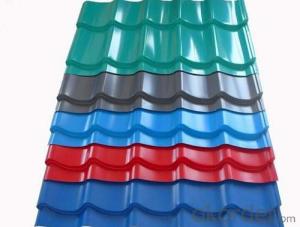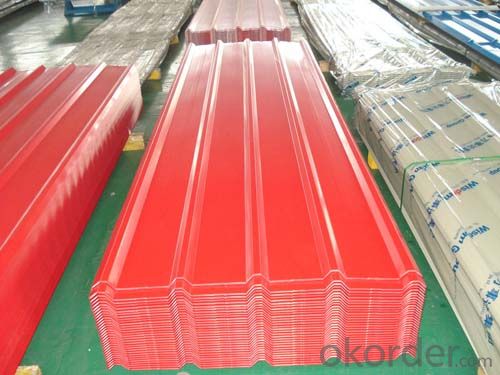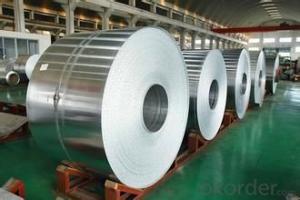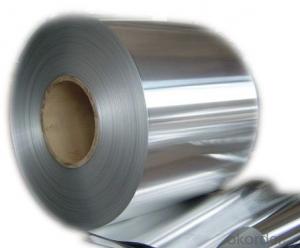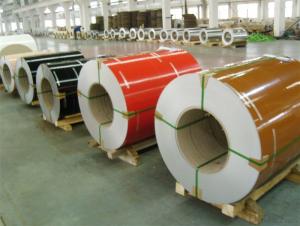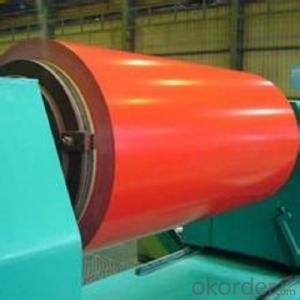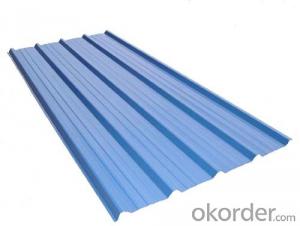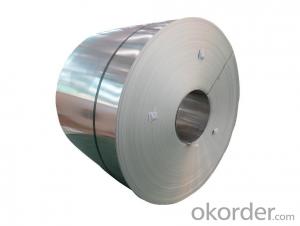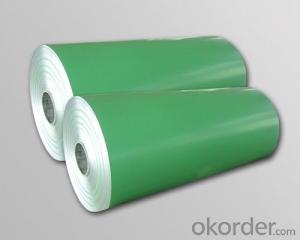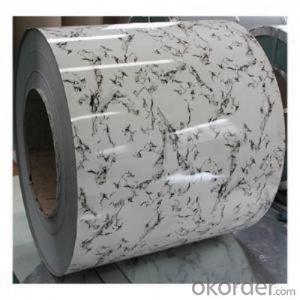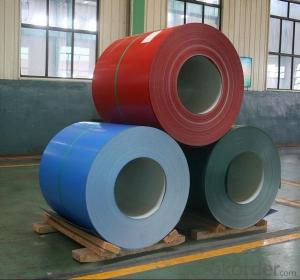1060 Aluminum Coils Clour Corrugated Aluminum Cladding Sheet Metal for Roofing
- Loading Port:
- China main port
- Payment Terms:
- TT OR LC
- Min Order Qty:
- 5 m.t.
- Supply Capability:
- 5000 m.t./month
OKorder Service Pledge
OKorder Financial Service
You Might Also Like
Specification
1. Description of Clour Corrugated Aluminum Cladding Sheet Metal for Roofing
Grade and Temper | Alloy: 1100, 1050, 1060, 2024, 3003, 5052, 5754, 6061, 6063, 7075, etc. Alloy: O-H112 |
| Width | 20mm -2300 mm available |
| Thickness | 0.2mm - 200mm |
| Coil Specifications | I.D.: 405mm, 505mm, with aluminum core, paper core or without core available |
| Packing Detail | Wooden pallet either eye to wall or eye to sky |
2. Application of Clour Corrugated Aluminum Cladding Sheet Metal for Roofing
Aluminum Roofing Sheet, Aluminum Suspended Ceiling, Aluminum Sandwich Panel, Wall Cladding Panel, Roller Shutter, Metal Roofing, Conner Bead, etc.
3. Feature of Clour Corrugated Aluminum Cladding Sheet Metal for Roofing
1.High temperature resistant
2.Weathering resistant
3.Scrubbing resistant
4.Sound insulation
5.Acid or alkali proof
6. Fireproof
7.Light weight material is easy to construct and install
4. Certificate:
SGS and ROHS(if client request, paid by client), MTC(plant provided), Certificate of Origin(FORM A, FORM E, CO), Bureau Veritas and SGS (if client request, paid by client), CIQS certificate
5. Image of Clour Corrugated Aluminum Cladding Sheet Metal for Roofing
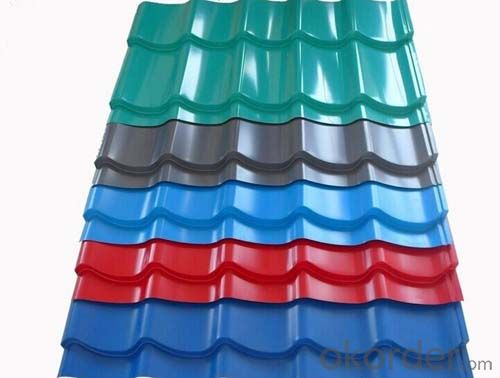
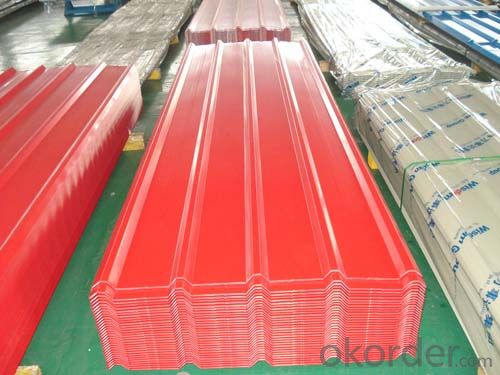
5. FAQ
1) What is the delivery time?
Dpends on actual order, around 20 days
2) What is the QC system:
We have QC staff of 20 persons and advanced equipment, each production is with MTC traced from Aluminum ingot lot.
3) What market do you mainly sell to?
Australia, America, Asia, Middle East, Western Europe, Africa etc
- Q: This question asks about the economic impact of aluminum coils, which are a key material in various industries.
- <p>Aluminum coils significantly impact the economy by driving growth in various sectors. They are vital in construction, automotive, aerospace, and packaging industries due to their lightweight, durability, and recyclability. The aluminum coil market stimulates manufacturing, job creation, and technological advancements. Additionally, their high demand supports the growth of the aluminum industry, influencing trade and contributing to GDP. The recycling of aluminum coils also reduces energy consumption and environmental impact, further benefiting the economy by promoting sustainable practices.</p>
- Q: Can the displacement sensor be used for real-time measurement of the aluminum coil thickness?
- Yes, you can use two sensors to measure thickness, either contact sensor or laser sensor
- Q: Are aluminum coils suitable for electrical conductors?
- Yes, aluminum coils are suitable for electrical conductors. Aluminum is a good conductor of electricity, second only to copper in terms of conductivity. It is widely used in various electrical applications, including power transmission lines, wiring, and electrical coils. Aluminum coils offer excellent electrical conductivity while also being lightweight, cost-effective, and resistant to corrosion.
- Q: How do aluminum coils contribute to sustainable building practices?
- Aluminum coils contribute to sustainable building practices in several ways. Firstly, aluminum is a highly recyclable material, meaning that the production and use of aluminum coils have a minimal impact on the environment. Recycling aluminum requires only a fraction of the energy needed to produce new aluminum, reducing greenhouse gas emissions and conserving natural resources. Additionally, aluminum coils are lightweight and durable, making them an ideal choice for sustainable building practices. The lightweight nature of aluminum reduces the load on the building structure, leading to lower transportation costs and energy consumption during construction. Its durability ensures that aluminum coils have a long lifespan, reducing the need for frequent replacements and associated waste generation. Furthermore, aluminum is resistant to corrosion and requires minimal maintenance. This quality contributes to the longevity of buildings, reducing the need for repairs and replacements over time. This not only saves resources but also reduces the overall environmental impact of the building. Moreover, aluminum coils offer excellent thermal conductivity, which can contribute to energy efficiency in buildings. When used as part of insulation systems or in HVAC systems, aluminum coils help to regulate temperature and minimize energy consumption. This can result in reduced energy bills and a smaller carbon footprint for the building. Lastly, aluminum coils can be used in various applications, including roofing, cladding, and ventilation systems. Their versatility allows for creative and innovative design solutions, promoting sustainable building practices by incorporating energy-efficient features and promoting natural ventilation. In conclusion, aluminum coils contribute to sustainable building practices through their recyclability, lightweight and durable nature, resistance to corrosion, thermal conductivity, and versatility. By choosing aluminum coils for construction, we can minimize the environmental impact of buildings, conserve resources, and promote energy efficiency, ultimately leading to a more sustainable built environment.
- Q: Using principles of chemical bonding, explain why solid aluminum is a good conductor of electricity but solid aluminum chloride is not. NaCl has a boiling point of 1413 degrees celcius wheras BrCl has a boiling point of 5 degrees celcius. Account for this difference using chemical bonding and molecular structure.
- Pure aluminium is a good conductor because it's atoms are metalically bonded. This means it's electrons are delocalised and can therefore produce a current. NaCl has a high boiling point because in order to evaporate it first needs to melt. And to melt it you need to break it's lattice structure. Na and Cl atoms are held by strong ionic bonds. BrCl on the other hand is covalently bonded. It's molecular structure does not need to be broken in order for it to melt or boil. All that has to be done is weak van der waal bonds need to be broken.
- Q: Are aluminum coils suitable for gutter systems?
- Indeed, gutter systems find aluminum coils to be quite suitable. Given its durability, lightweight composition, and exceptional resistance to rust and corrosion, aluminum stands as a favored selection for gutter systems. This cost-effective alternative can endure severe weather conditions while boasting an extensive lifespan. Furthermore, the installation and maintenance of aluminum coils prove to be effortless, rendering them an optimal choice for gutter systems.
- Q: What are the different thicknesses available for aluminum coils?
- To meet different application needs, aluminum coils come in various thicknesses. The available options typically span from 0.2mm to 6mm. The thickness required depends on the intended use of the coil. For applications that prioritize flexibility and lightweight properties, thinner coils ranging from 0.2mm to 1mm are commonly used in electronics, packaging, and building materials. Medium thickness coils, ranging from 1mm to 3mm, find frequent use in automotive parts, roofing, and cladding applications. Conversely, heavier-duty industrial applications like shipbuilding, aerospace, and construction utilize thicker aluminum coils, measuring 3mm to 6mm in thickness. To determine the most suitable thickness for a given application, it is crucial to consider the specific requirements and intended use of the aluminum coil.
- Q: Are aluminum coils resistant to UV rays?
- Generally, aluminum coils possess resistance against UV rays. Aluminum, being a non-reactive metal, does not easily corrode or react with other substances. This resistance to corrosion also extends to UV rays. UV rays are a type of radiation emitted by the sun and can cause gradual damage to various materials, including fading, discoloration, and degradation. However, aluminum is renowned for its ability to withstand UV rays without significant harm. Hence, aluminum coils are an appropriate option for outdoor applications that involve exposure to sunlight and UV rays, such as air conditioning systems, refrigeration units, and solar panels. Furthermore, aluminum coils can be coated with protective finishes or paints to further enhance their resistance to UV rays and prolong their lifespan.
- Q: Can aluminum coils be used for electrical enclosures?
- Electrical enclosures can indeed utilize aluminum coils. Aluminum, being a lightweight and durable substance, boasts exceptional electrical conductivity and heat dissipation capabilities. Furthermore, it exhibits commendable resistance to corrosion, rendering it appropriate for diverse environmental circumstances. Due to its malleability, aluminum coils effortlessly adopt various shapes and sizes, rendering them highly adaptable for enclosure designs. Moreover, aluminum represents a cost-effective alternative when compared to metals such as stainless steel. Nonetheless, it remains crucial to guarantee adequate insulation and grounding to avert any potential electrical hazards when employing aluminum coils in electrical enclosures.
- Q: Can aluminum coils be used in outdoor applications?
- Indeed, outdoor applications can make use of aluminum coils. Given its remarkable resistance to corrosion, aluminum proves to be an appropriate material for outdoor purposes. It finds frequent employment within the construction sector for various outdoor structures, including roofs, gutters, and siding. Moreover, the lightweight and manageable nature of aluminum coils contribute to their widespread preference in outdoor applications. Nevertheless, it is crucial to bear in mind that the particular grade and thickness of the aluminum coil must be carefully evaluated to ensure its endurance against the environmental conditions unique to the specific outdoor application.
Send your message to us
1060 Aluminum Coils Clour Corrugated Aluminum Cladding Sheet Metal for Roofing
- Loading Port:
- China main port
- Payment Terms:
- TT OR LC
- Min Order Qty:
- 5 m.t.
- Supply Capability:
- 5000 m.t./month
OKorder Service Pledge
OKorder Financial Service
Similar products
Hot products
Hot Searches
Related keywords
